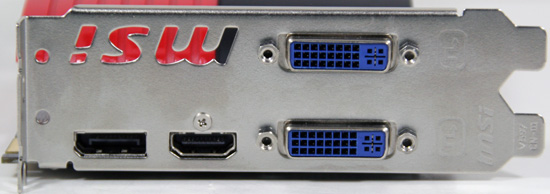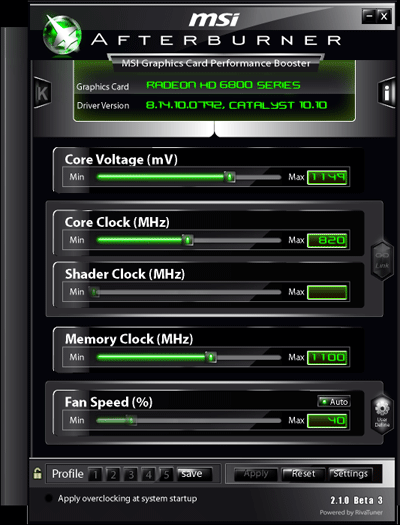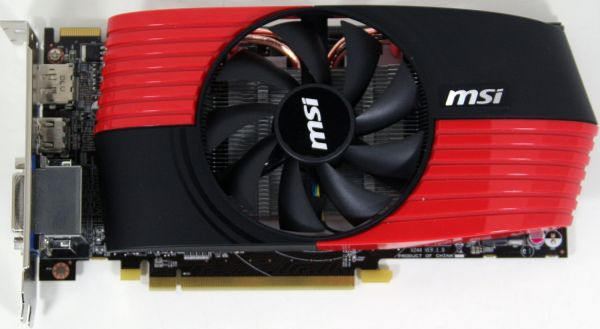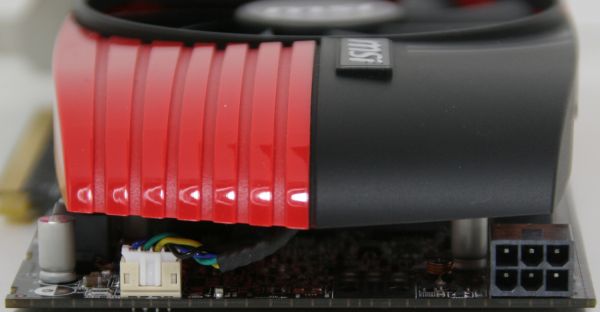AMD Radeon HD 6850 Overclocking Roundup: Asus, XFX, & MSI
by Ryan Smith on November 8, 2010 12:40 AM ESTMeet The MSI R6850 OC
The final card in today’s roundup is MSI’s R6850 OC. The R6850 OC is one of the first 6850s being released with a significant overclock, with MSI releasing it at 820MHz core and 1100MHz (4400MHz effective) memory, a 45MHz (5.8%) core and 100MHz (10%) memory overclock respectively. Besides the overclock, the card is identical to MSI’s existing R6850, using the same PCB and cooler as its stock-clocked counterpart.
Starting with the PCB, MSI is also using a non-reference PCB, this time using a shorter 8.5” PCB. In fact it's the same PCB as on the XFX card, leading us to believe that this is an alternative 1x DisplayPort PCB from AMD. In any case, because it's the same PCB as the XFX it means it's sharing the same design flaws: MSI has kept the PCIe power sockets on the rear of the card, so the practical length of the card is longer. Furthermore in the case of the MSI card, the card’s plastic shroud hangs over the end of the card, making the card 9” long in practice. As a result the end-user benefits of the shorter PCB are more or less wasted.
Attached to the PCB is MSI’s cooler, which bears a striking resemblance to Asus’s DirectCU cooler. Here MSI is using a pair of copper heatpipes to transfer heat from the baseplate to an aluminum heatsink that runs most of the length of the card. In the center is an 80mm fan providing airflow for cooling, and on top of that a shroud to direct airflow out of the front and the back of the card. Compared to the Asus DirectCU cooler, the biggest differences are that MSI is using a larger fan and copper heatpipes in place of aluminum heatpipes.
As for the port configuration, MSI is using the same configuration as both XFX and Asus: two DVI ports, one HDMI port, and one full-size DisplayPort, meaning the card can drive up to 5 monitors with a DP hub.

For the R6850, MSI’s ace in the hole is the software rather than the hardware. The R6850 comes with MSI’s fantastic Afterburner software, which comes with allows overclocking and monitoring, and on the R6850 it even allows voltage modification. While MSI makes this software available for use on non-MSI cards, we always make it a point to tip our hat in their direction as Afterburner continues to be the gold standard in overclocking software.

Rounding out the package is the usual collection of odds & ends: a quick-start manual, driver/utility CD, molex-to-PCIe power adaptor, a long CrossFire bridge, and a DVI-to-VGA dongle. Unfortunately we don’t have pricing information for the R6850 OC at this time, but we’ve already seeing the stock-clocked version at around $190, so we’d expect the R6850 OC to go for around $200, a $20 markup over the AMD MSRP for a reference card and roughly in-line with other factory overclocked cards. Meanwhile on the support side of matters, MSI is providing a 3 year warranty with the card.


















93 Comments
View All Comments
tech6 - Monday, November 8, 2010 - link
Please don't feed the troll.haplo602 - Monday, November 8, 2010 - link
on the test setup page:Video Cards: AMD Radeon HD 6870
AMD Radeon HD 6850
AMD Radeon HD 5870
AMD Radeon HD 5850
AMD Radeon HD 5770
AMD Radeon HD 4870
NVIDIA GeForce GTX 480
NVIDIA GeForce GTX 470
NVIDIA GeForce GTX 460 1GB
NVIDIA GeForce GTX 460 768MB
>>>>>>>>>>>>>>> NVIDIA GeForce GTS 450 <<<<<<<<<<<<<<<
NVIDIA GeForce GTX 285
NVIDIA GeForce GTX 260 Core 216
XFX Radeon HD 6850
MSI R6850 OC
Asus EAH6850
However the card is nowhere in the graphs. Yet 5770 is there .... I was actualy interested in that comparison. thanks for the good work.
Ryan Smith - Monday, November 8, 2010 - link
I actually don't have the GTS 450 on the new test suite. We'll be updating Bench this next week, at which point it'll show up.Marburg U - Monday, November 8, 2010 - link
http://img838.imageshack.us/i/gpu46068706850ocstud...DoktorSleepless - Monday, November 8, 2010 - link
I would actually love to see the GTX 460 FTW in these charts because 850 mhz is a typical OC you can get from any regular GTX 460. The 460 and the 6850 are direct competitors so having both their overclock results side by side would be nice.kmmatney - Monday, November 8, 2010 - link
I have a HD4890, which is a power hog, yet I can run it at near silence, fully overclocked, with an Accelero S1 Rev 2 and a whisper fan. Too bad they don't offer a card with this sort of cooler pre-installed - then it would be possible to overclock these cards and still keep a quiet system. I wonder if this cooler will fit on these new cards? The cooler worked great onteh HD4890, but I did have to buy an extra heatsink for the VRMs (and had to hacksaw that to make it fit).Pantsu - Monday, November 8, 2010 - link
Can't the XFX cooler be adjusted with a tool like Afterburner? I mean that would solve the noise issue afaik. But if it's stuck that way there's no reason to buy it.casteve - Monday, November 8, 2010 - link
+1. Why not use Afterburner to remove some of the variables and see how the tested coolers stack up db vs temp?Oxford Guy - Sunday, November 14, 2010 - link
Yes.El_Capitan - Monday, November 8, 2010 - link
Newegg's Lowest prices (11/8/2010):HD 5870 1GB.................$299.99 (plus $2.99 shipping)
GTX 470 1.28GB............$249.99 (free shipping)
HD 6870 1GB.................$239.99 (plus $7.56 shipping)
HD 5850 1GB.................$239.99 (free shipping)
GTX 460 1GB..................$189.99 (plus $3.99 shipping)
HD 6850 1GB.................$179.99 (plus $7.56 shipping)
GTX 460 768MB.............$159.99 (free shipping)
GTS 450 1GB .................$109.99 (free shipping)
Just comparing the above, there's really two competitive ranges:
The $239.99 to $249.99 price range which includes the GTX 470 1.28GB, the HD 6870 1GB, and the HD 5850 1GB.
The $179.99 - $189.99 price range which includes the GTX 460 1GB, and the HD 6850 1GB.
How, if we're going by OVERCLOCKED comparisons for a SINGLE card, especially at the highest two resolutions (1920 x 1200 and 2560 x 1600):
1. The GTX 470 1.28GB overclocked definitely edges out both the overclocked HD 6870 1GB and HD 5850 in performance, while the HD 6870 1GB would be my pick over the HD 5850 1GB, both being the same price.
2. The GTX 460 1GB and the HD 6850 1GB are both great cards. However, seeing the Max Overclock for the HD 6850 with a Max Overclocked Voltage at 1.22v being 960MHz, and a Max Overclock witnessed for the GTX 460 1GB with a Max Overclocked Voltage at 1.087v being 1015MHz (most are in the 880MHz - 950MHz range), the GTX 460 1GB has a greater potential of overclocking ability than the HD 6850. Given that a GTX 460 1GB overclocked slightly betters that of a GTX 470 1.28GB at stock, the winner is obviously the GTX 460 1GB.
Please include the GTX 460 1GB overclocks when comparing overclocks with the HD 6850. Most of us are mature and smart enough to make our own decisions based upon test results, rather than guesswork. Those that are biased one way or another are going to believe what they want no matter what. All that we really losing out on, is our confidence that the site that's doing the review is behaving the same way. If we don't see it here, we're just going to go see it somewhere else.